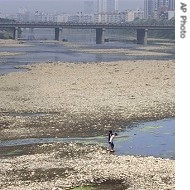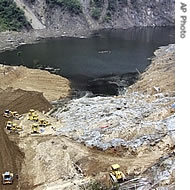VOA标准英语2008年-Flood Risk Keeps Thousands in China Away From T
搜索关注在线英语听力室公众号:tingroom,领取免费英语资料大礼包。
(单词翻译)
By Jamila Trindle
Mianyang, Sichuan Province, China
06 June 2008
Three weeks after the earthquake in China's Sichuan province displaced five million people, a few hundred thousand have had to move again - out of the way of a dammed river that poses a flood risk. As Jamila Trindle reports from near the city of Mianyang, many of the quake's survivors1 are anxious to get back home.
 |
| Residents walk along riverbed downstream of Tangjiashan quake-formed lake, Sichuan province, 06 Jun 2008 |
The city of Mianyang was hit hard by the May 12 earthquake. Tents line the roads, temporary homes for people living in front of their damaged houses and shops.
But just north of the city, the tents disappear. Low-lying areas have been evacuated3 and people have been sent to higher ground. Landslides4 during the earthquake dammed a river further north, creating what is now called the Tangjiashan lake.
Thousands of soldiers have worked for days to gradually drain the lake, the largest of more than 30 formed by the quake. But experts fear that aftershocks could shake loose the dam before the lake is empty, flooding communities downstream.
Thousands of people from nearby villages are taking refuge at the top of a mountain known as Tao Hua. If the dam gives way and the lake floods the valley, the mountain should remain above the water.
Wen Feng brought his family here even before authorities began ordering small towns to evacuate2. Wen said he had to bring his child and elderly parents here to the top of the hill immediately because they cannot flee if the flood comes. For adults like himself, he said, it is not a problem to flee, but he came here just for them.
Wen said he could not imagine losing his parents and seven-year-old son. He sits in a tent made from nylon tarps supported by small branches. He and his family have already had to move several times, and he said he does not know when they will be able to go home. He has nightmares about the quake, the aftershocks and now the flood, too.
Wen said everyone wants a quiet, peaceful life. "But the quake and the flood makes everyone here nervous. If the situation continues like this," he said, "our hearts will not be able to take it anymore."
It is hot on the mountain, and many people have retreated into the woods nearby to play cards in the shade. One woman, Wang Jin Hui, said she still worries, even here.
 |
| The major project of a sluice5 from the Tangjiashan Lake is completed at quake-induced Tangjiashan Lake in southwest China's Sichuan province, 31 May 2008 |
Wang said she worries about a bigger earthquake or the flood coming, that maybe the place where they are staying now will also be destroyed. After the quake, she said, her legs always feel soft, like she is swaying in the wind when she walks. All day her brain is nervous, and her heart feels like it will stop.
One disaster has been compounded by the threat of another. Wang still seems amazed at their predicament.
"It is crazy," she said. "The quake is not finished, but the flood is coming."
Yet every person says they will go back to their villages.
Wang said life will be hard if they go back. They will have to live in tents, but at least they can harvest the crops left in the fields. That remains6 one of their biggest concerns - for some people, those crops are all they have left.
Zhou Guo Tai is the accountant for Tai Bei village. He says his village was one of the first to be evacuated, so they have been here for 10 days. And during that time, the financial losses from their crops keeps mounting.
He says people are definitely more anxious here. Not only the farmers but also the officials are quite anxious. He really hopes the people can return to their homes as soon as possible.
He sits in front of a blue tent labeled "Tai Bei Village Office" tallying7 numbers. He says it is too hot inside the tents to do anything.
As some of the evacuees8 voice their anxieties, Wang Jin Qun tries to put things in perspective. She says of course they are very anxious about staying here too long. Their crops are still in the fields and cannot be harvested. But, Wang says, safety is the most important thing; life is the most important.
 收听单词发音
收听单词发音 




